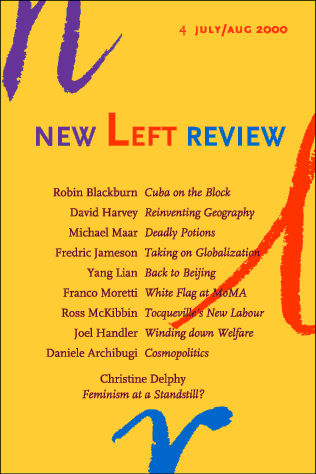How has the Cuban Revolution withstood the American siege at the end of the century? In the wake of the Elián González affair, Robin Blackburn looks at exile politics in Miami, the record of the White House, and the scene in Havana.
A Chinese poet rediscovers his native city, learning how much a favourable book review costs. Vignettes of China’s new ‘literary merchants’ drawing water from Mao’s well, with a faux slice of the Great Wall in the garden; and of its older industrial workers, destined for the scrapheap.
The all-purpose G-word, as slogan and euphemism, needs taking apart. Fredric Jameson dismantles its different components—technological, political, cultural, economic and social—and reassembles them into a coherent target for collective resistance.
McKibbin argues that New Labour's constitutional tensions are inherited from the Thatcherite project of centralizing power in order to promote a neoliberal political economy; and Labour's previous commitments to devolution. Tocqueville's view of constitutional inheritance and evolution is cited in opposition to Mair's model of a coherent Blairite strategy.
Interview with the leading practitioner of a materialism Marxists forgot. What happens when space, not time, becomes the axis of radical analysis? From post-war planning to the cities of European literature, the limits of over-accumulation to the flux of postmodernity, David Harvey talks about his work and what it has tracked.
Time was when New York’s Museum of Modern Art plumed itself as an uncompromising guardian of Modernism. The arrival of its ‘themed’ re-hang—mimicked now at London’s Tate Modern—reduces a hundred years of defiguration to a stroll through an aesthetic department store.
Could there have been a link between Kleist’s suicide and Wagner’s Liebestod? Michael Maar’s bravura exploration of the ties of life and art that bound the composer to the writer—sexual and lethal passions in the same retort.
Clinton’s finest hour, on the welfare front. The moral hysterias and mean calculations of US reform are now a benchmark for post-social-democracy in Britain. Joel Handler considers the fall in American welfare rolls, and the realities of poverty and vulnerability behind them.
When the nation-state loses many of its traditional powers, Daniele Archibugi argues, democracy requires a cosmopolitan political authority above it. But current ‘humanitarian’ interventions do not fulfil such higher norms—they betray them, as the self-arrogated prerogatives of the few.
Michael Gilsenan on Edward Said, Out of Place. At the unsettled origins of Orientalism—memoirs of gilded dispossession in a colonial Middle East.
Christine Delphy on Lynne Segal, Why Feminism? A critical look at the relations between psychoanalytic culture and women’s freedom, gender and nature—what is the fit?
Jonathan Rée on Malcolm Bull, Seeing Things Hidden. The metaphysics and politics of hiding—apocalyptic visions, sanguine or saturnine.
Tom Mertes on Naomi Klein, No Logo. Emblems of ownership: from branding hides to clothes, cattle to people? A Canadian reporter’s stinging attack on the new corporate logic behind logo-mania.
Terry Eagleton on Russell Jacoby, The End of Utopia. What surer sign of accommodation to the status quo than pompous funerals of the utopian imagination? Masks and corollaries of political resignation.
